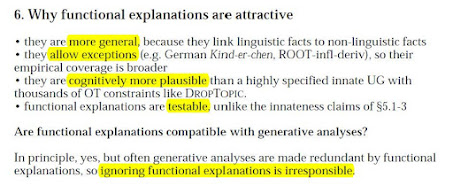Haspelmath (2002): "...ignoring functional explanations is irresponsible."
...no se fijan en la eficacia del mecanismo, sino en la disposición de sus partes. [Borges]
Eta gauza da ze esaldi horrek ederki erakusten du zéin den diferentzia nagusia artén hizkuntzalaritza formala (chomskyarra) eta hizkuntzalaritza funtzionala, zeintaz mintzatu ginen an ondoko sarrera hau:
Han aipatzen genuén dokumentu bat ganik hizkuntzalari funtzionalistá Martin Haspelmath (2002), titulatuá "Functionalist linguistics: usage-based explanations of language structure", non autoreak planteatzen dituén linguistika funtzionalistaren oinarrizko galdera-erantzunak:
- Why is language structure the way it is?
not: How can language be acquired despite the poverty of the stimulus?
- Language structure is the way it is because it reflects constraints on language use.
typically this means: because it is adapted to the needs of language users.
- How can language structure "reflectt" language use?
There must be an evolutionary/adaptative process, perhaps involving variation and selection.
Hizkuntzalari alemaniarrak dio burúz azalpen funtizonalak (benetako azalpenak baitira):
- they are more general,...
- they allow exceptions,...
- they are cognitively more plausible than a highly specified innate UG [Universal Grammar]...
eta, ikusten dugunez, amaitzen du esánez:
- ..., so ignoring functional explanations is irresponsible. [Haspelmath, 2002]
Bai, eta ignoratzea dá, adibidez, ez erantzutea, ez erantzutea noiz bádagoen erantzukizuna, ez izatea erantzulea, ez izatea responsablea. [491] [>>>] [A16] [A17] (EZ [A17B]) (EZ [A17C]) [A18]
Etiketak: Chomsky, forma-funtzioa, garabideak, gradualki, Haspelmath



0 Comments:
Argitaratu iruzkina
<< Home